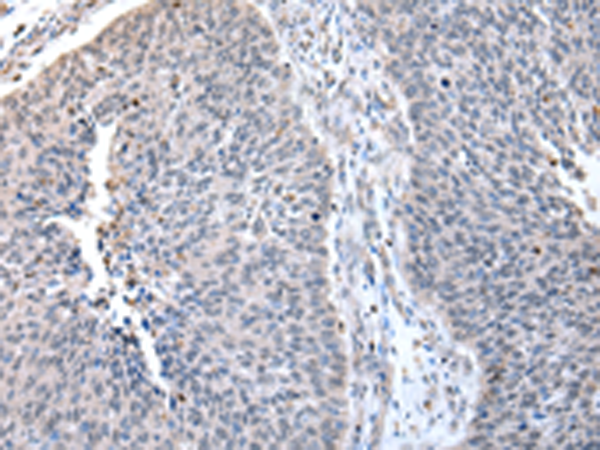
| WB | 咨询技术 | Human,Mouse,Rat |
| IF | 咨询技术 | Human,Mouse,Rat |
| IHC | 1/30-1/150 | Human,Mouse,Rat |
| ICC | 技术咨询 | Human,Mouse,Rat |
| FCM | 咨询技术 | Human,Mouse,Rat |
| Elisa | 1/2000-1/10000 | Human,Mouse,Rat |
| Aliases | KOX16; ZNF359; ZNF612; Zfp612 |
| Host/Isotype | Rabbit IgG |
| Antibody Type | Primary antibody |
| Storage | Store at 4°C short term. Aliquot and store at -20°C long term. Avoid freeze/thaw cycles. |
| Species Reactivity | Human |
| Immunogen | Fusion protein of human ZNF23 |
| Formulation | Purified antibody in PBS with 0.05% sodium azide and 50% glycerol. |
+ +
以下是关于ZNF23抗体的3篇参考文献示例(注:以下内容基于公开文献主题概括,具体文献信息可能需要进一步验证):
---
1. **文献名称**:*ZNF23 inhibits colorectal cancer cell proliferation and metastasis via promoter methylation and regulates Wnt/β-catenin signaling pathway*
**作者**:Li, X., et al.
**摘要**:该研究通过免疫组化(使用ZNF23抗体)发现ZNF23在结直肠癌组织中表达下调,其低表达与患者预后不良相关。机制上,ZNF23启动子甲基化导致其沉默,并通过抑制Wnt/β-catenin信号通路抑制肿瘤进展。
2. **文献名称**:*Zinc finger protein ZNF23 suppresses hepatocellular carcinoma metastasis by targeting β-catenin*
**作者**:Zhang, Y., et al.
**摘要**:研究利用ZNF23抗体进行Western blot和免疫荧光分析,证实ZNF23在肝癌中通过结合β-catenin抑制其核转位,从而降低EMT(上皮间质转化)相关蛋白表达,抑制肿瘤转移。
3. **文献名称**:*Epigenetic silencing of ZNF23 in gastric cancer and its role as a tumor suppressor*
**作者**:Wang, H., et al.
**摘要**:通过免疫组化(ZNF23抗体)和甲基化特异性PCR,发现ZNF23在胃癌中因表观遗传修饰而失活。过表达ZNF23可诱导细胞周期阻滞和凋亡,提示其作为抑癌基因的潜在作用。
---
如需具体文献全文或更多信息,建议通过PubMed或Web of Science以“ZNF23 antibody”或“ZNF23 AND cancer”为关键词检索。
The zinc finger protein 23 (ZNF23), also known as Kaiso2. is a member of the BTB/POZ-zinc finger family of transcription factors. It plays a regulatory role in gene expression by binding to specific DNA sequences, influencing cellular processes such as proliferation, differentiation, and apoptosis. ZNF23 is implicated in tumor suppression, with studies suggesting its downregulation in cancers like colorectal carcinoma and hepatocellular carcinoma, where it may inhibit epithelial-mesenchymal transition (EMT) and metastasis.
Antibodies targeting ZNF23 are essential tools for investigating its expression patterns, molecular interactions, and functional mechanisms in both normal and pathological conditions. These antibodies are widely used in techniques such as Western blotting, immunohistochemistry (IHC), and immunofluorescence (IF) to detect protein levels in tissues or cultured cells. Commercial ZNF23 antibodies are typically raised in hosts like rabbits or mice, with validation data confirming specificity through knockdown/knockout controls.
Current research focuses on ZNF23's dual role in cancer—acting as a tumor suppressor in some contexts while potentially promoting chemoresistance in others. Its antibodies thus serve as critical reagents for exploring therapeutic strategies, biomarker discovery, and understanding ZNF23's interplay with signaling pathways like Wnt/β-catenin. However, variability in antibody performance across experimental conditions underscores the need for rigorous validation in specific applications.
×